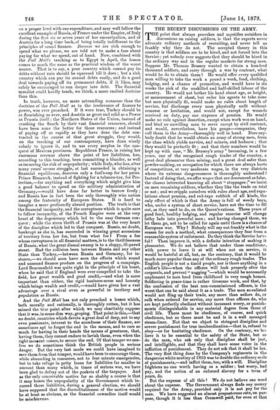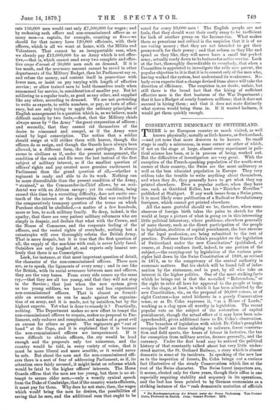THE RECENT DISCUSSIONS ON THE ARMY. T HE point that always
provokes and mystifies outsiders in discussions on raising soldiers, is that the experts never advocate ordinary methods of recruiting, and never tell us frankly why they do not. The accepted theory in this country is that soldiers are to be hired, and not forced into the Service ; yet nobody ever suggests that they should be hired in the ordinary way and in the regular markets for strong men. Suppose Mr. Thomas Brassey wanted to obtain a hundred thousand soldiers, and carry through a war by contract, what would he do to obtain them ? He would offer every qualified man willing to take the work a pound a week, food, clothing, lodging, and a chance of promotion, and would have in six weeks the pick of the unskilled and half-skilled labour of the country. He would not bother his head about age, or height, or measurement of chest, but order his agents to take none but men physically fit, would make no rules about length of service, but discharge every man physically unfit without remorse or hesitation, and would not, except for wounds received on duty, pay one sixpence of pension. He would make no rule against desertion, except when work was on hand, and bind no unwilling man to serve except by civil contract, and would, nevertheless, have his gangs—companies, they call them in the Army—thoroughly well in hand. Does any- body doubt that he would obtain an army of strong men, from the class which yields navvies, an3 miners, and hodmen ; that they would be perfectly fit ; and that their numbers would be kept up with ease, "Mr. Brassey's army" becoming, in a few years, one of the recognised rough trades of the country, a great deal pleasanter than mining, and a great deal safer than powder-making, an occupation for which there are always hosts of competitors, at very moderate wages, in the very districts where its extreme dangerousness is thoroughly understood ? Instead of doing that, we offer wages that are denounced as false, the classes interested knowing all about "stoppages ;" we insist on men remaining soldiers, whether they like the trade on trial or not ; and we cripple ourselves with rules about age, and regu- lations about pension, and red-tape rubbish of all kinds, the only effect of which is that the Army is full of weedy boys, who, under a system of short service, have not the time to fill out, as they used to do, on the Queen's rations. Three years of good food, healthy lodging, and regular exercise will change lathy lads into powerful men ; and having changed them, we let them go, not to be called for again until there is a chance of European war. Why ? Nobody will say out frankly what is the reason for such a method, what consequences they fear from a reasonable system of enlistment. Do they think the Service hate- full Then improve it, with a definite intention of making it pleasanter. We do not believe that under those conditions, with power to leave it at will when not on service, it would be hateful at all, but, on the contrary, that it would be much more popular than any of the ordinary rough trades. The English people is not a timid people, nor is there anything in a soldier's life—when the officers will look properly after the corporals, and prevent" nagging "—which would be necessarily unpleasant to men bred from childhood in very rough homes. Soldiering in peace-time is rather tiresome work, and that, by the confession of the best non-commissioned officers, is the worst that can be said about it as a trade. The men so enlisted would not fling up their trade, any more than sailors do, or sulk when ordered for service, any more than officers do, who are kept perfectly obedient without incessant worry, or punish- ments distinguishable in any material degree from those of civil life. There must be obedience, of course, and quick obedience, but so there must be and is in a well managed• steam-liner. Not that we object to stringent discipline and severe punishment for true insubordination—that is, refusal to obey—or for hesitating obedience. On the contrary, we be- lieve it to be essential to the safety of the State, but so do the men, who ask only that discipline shall be just, and intelligible, and that they shall have some voice in the infliction of punishment. They do not ask that it shall be lax. The very first thing done by the Company's regiments in the dangerous white mutiny of 1859 was to double the ordinary scale of punishments,—and inflict them, too, with a will. Discipline frightens no one worth having as a soldier ; but worry, bad pay, and the notion of an enforced slavery for a term of years, do. But the expense of all this We do not believe one word about the expense. The Government always finds any money required for the Army, provided only it is not pay for the men. We have suggested an almost preposterous rate, on pur- pose, though it is less than Cromwell paid, for even at that
rate 150,000 men would cost only £7,500,000 for wages ; and by reckoning each officer and non-commissioned officer as so many men—a captain, for example, counting as five—we should for that money have 120,000 efficients, with their officers, which is all we want at home, with the Militia and Volunteers. That cannot be an insupportable sum, when we already pay £13,000,000 for an Army which is not effec- tive,—that is, which cannot send away two complete and effec- tive corps d armee of 30,000 men each on demand. If it is too much, and the necessary amount cannot be saved in other departments of the Military Budget, then let Parliament say so, and refuse the money, and content itself in peace-time with fewer men, or insist on pay varying with length of effective service ; or allow trained men to hold themselves ready when summoned for service, in consideration of smaller pay. But let soldiering be a regular trade, as good as any other, and supplied like any other, according to demand. We are not pretending to write as experts, to settle numbers, or pay, or tests of effici- ency, but are only trying to apply the ordinary principles of English management to a question which is, as we believe, made difficult mainly by two facts,—first, that the Military chiefs always mean by "the Army" the great corporation of officers ; and secondly, that they cannot rid themselves of the desire to command and compel, as if the Army were raised by legal conscription. The notion that a soldier should resign at will strikes them with horror, though the officers do so resign, and though the Guards have always been allowed, in a different form, the same privileges. It always seems to civilians as if, under the present management, the condition of the rank and file were the last instead of the first subject of military interest, as if the smallest question of officers' rights and pay created more genuine excitement in Parliament than the grand question of all,—whether a regiment is ready and able to do its work. Nothing can be more discreditable than the present condition of the Army, "strained," as the Commander-in-Chief allows, by an acci- dental war with an African savage ; yet its condition, being caused this time by a recruiting difficulty, does not excite one- tenth of the interest or the observation that was excited by the comparatively trumpery question of the terms on which Purchase should be abolished,—a matter of a few hundreds, more or less, to each military family. So deep, indeed, is the apathy, that there are very patient military reformers who are simply in despair, and declare that what with the Crown, and the House of Commons, and the corporate feeling of the officers, and the vested rights of everybody, nothing but a catastrophe will ever thoroughly reform the British Army. That is mere despair, but it is true that the first question of all, the supply of the machine with coal, is never fairly faced. Outsiders are only laughed at, and experts only lament use- lessly that there is no Conscription. Look, for instance, at that most important question of detail, the character of the non-commissioned officers. These men are, so to speak, the ligaments of every army ; and in one like the British, with its social severance between men and officers, they are the very bones. From every side comes up the same cry,—that they are all too young, and that they will not stop in the Service ; that just when the new system gives us too young soldiers, we have less and less experienced
non-commissioned officers. That is almost as formid- able an accusation as can be made against the organisa- tion of an army, and it is made, not by outsiders, but by the highest experts. Yet what is done to remedy it ? Practically, nothing. The Department makes no new effort to tempt the non-commissioned officers to remain, makes no proposal to Par- liament, only endures and complains, and makes of a great evil an excuse for others as great. The regiments get "out of
hand" at the Cape, and it is explained that it is because the non-commissioned officers are inexperienced. If it were difficult to obtain officers, the , cry would be loud enough and the proposals only too numerous, and the country would be told, in every variety of voice, that it must be more liberal and more sensible, or it would never be safe. But about the men and the non-commissioned offi- cers there is a sort of fear of addressing Parliament, as if, its attention once fairly aroused, it might insist on reforms which would be fatal to the higher officers' interests. The Horse Guards affirm that the men are too young, but there is no at- tempt to secure older men,—only a wearily cynical speech from the Duke of Cambridge, that if the country wants efficients, it must pay for them. Why does he not state, then, the wages which would bring the men he desires, the possibilities of saving that he sees, and the additional sum that ought to be voted for every 10,000 men ? The English people are not fools, that they should want their costly army to be inefficient for lack of another penny on the Income-tax. What makes them so penurious and critical is the suspicion that it is of no use voting money ; that they are not intended to get their pennyworth for their penny ; and that reform as they like and spend as they like, they will never have a small but perfect army, actually ready down to its buttons for active service. Look at the fact, thoroughly discreditable to everybody, that when a Committee is appointed to investigate the evils now patent, the popular objection to it is that it is to consist only of the men who, having worked the system, best understand its weaknessea. No- body even expects that a change devised from above will take the direction of efficiency. The suspicion is, no doubt, unfair, but still there is the broad fact that the hiring of sufficient effective men is the first business of the War Department ; that it has a Budget of nearly fourteen millions; that it does not succeed in hiring them ; and that it does not state distinctly what system would bring them in. If it wanted hodmen, it would get them quickly enough.



































 Previous page
Previous page